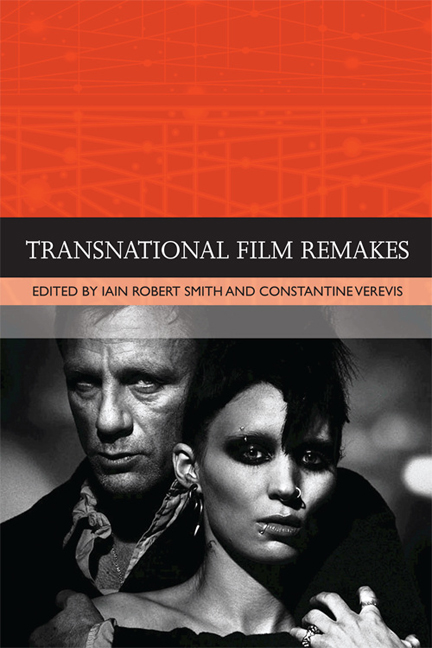Book contents
- Frontmatter
- Contents
- List of Illustrations
- Traditions in World Cinema
- Introduction: Transnational Film Remakes
- PART I GENRES AND TRADITIONS
- PART II GENDER AND PERFORMANCE
- PART III AUTEURS AND CRITICS
- 9 A Tale of Two Balloons: Intercultural Cinema and Transnational Nostalgia in Le voyage du ballon rouge
- 10 ‘Crazed Heat’: Nakahira Ko and the Transnational Self-remake
- 11 Remaking Funny Games: Michael Haneke's Cross-cultural Experiment
- 12 Reinterpreting Revenge: Authorship, Excess and the Critical Reception of Spike Lee's Oldboy
- 13 The Transnational Film Remake in the American Press
- Notes on the Contributors
- Index
11 - Remaking Funny Games: Michael Haneke's Cross-cultural Experiment
from PART III - AUTEURS AND CRITICS
Published online by Cambridge University Press: 22 December 2017
- Frontmatter
- Contents
- List of Illustrations
- Traditions in World Cinema
- Introduction: Transnational Film Remakes
- PART I GENRES AND TRADITIONS
- PART II GENDER AND PERFORMANCE
- PART III AUTEURS AND CRITICS
- 9 A Tale of Two Balloons: Intercultural Cinema and Transnational Nostalgia in Le voyage du ballon rouge
- 10 ‘Crazed Heat’: Nakahira Ko and the Transnational Self-remake
- 11 Remaking Funny Games: Michael Haneke's Cross-cultural Experiment
- 12 Reinterpreting Revenge: Authorship, Excess and the Critical Reception of Spike Lee's Oldboy
- 13 The Transnational Film Remake in the American Press
- Notes on the Contributors
- Index
Summary
Over the past decades, Austrian director and screenwriter Michael Haneke has become internationally known for disturbing films that raise questions of morality and seek to systematically undermine viewers’ expectations while holding them responsible for the crimes and violence playing out on screen. Haneke scholar Catherine Wheatley has observed that
the numerous awards and critical acclaim garnered by La Pianiste [The Piano Teacher, 2001], and … Cache [Hidden, 2005], have cemented Haneke's status as one of a new generation of auteurs currently leading European cinema, alongside (among others) the Dardenne brothers, Catherine Breillat, Lars von Trier, Gaspar Noe and Francois Ozon, all of whom have been known to offer dismal – even nihilistic – perspectives on the current state of society. (2009: 14)
Haneke's most recent films, Das weiBe Band (The White Ribbon, 2009) and Amour (2012), have earned him an unprecedented number of nominations and awards, among them not only two Palmes d'Or at the Cannes Film Festival and various other European film prizes but, for the first time in his career, also two Golden Globes and one Academy Award for Best Foreign Language Film from juries in the USA. His status as European auteur has been sealed by the overwhelming critical success of Das weiBe Band and Amour, which are, like most Haneke films, transnationally funded and executed projects.
Das weiBe Band, a German-language film set in rural Protestant Germany in the years leading up to World War I, deals with a specifically German theme, was shot in Germany, and had a German cast and crew; but it is also a co-production between Germany, Austria, France and Italy. Amour, on the other hand, is a French-language film that tells the story of an elderly couple struggling to cope with the slow, agonising death of the wife. Filmed in France, it stars French actors Jean-Louis Trintignant, Emmanuelle Riva and Isabelle Huppert, and has a Franco-German-Austrian production context. Many films made outside the USA (or more precisely: Hollywood) are, of course, transnational co-productions. Unable to compete with Hollywood's high budgets and marketing machine, national film industries in Europe ‘pool finances, government subsidies, labour and talent’ (Baltruschat 2013: 11) for projects that gain immediate access to the different national markets involved.
- Type
- Chapter
- Information
- Transnational Film Remakes , pp. 177 - 194Publisher: Edinburgh University PressPrint publication year: 2017



